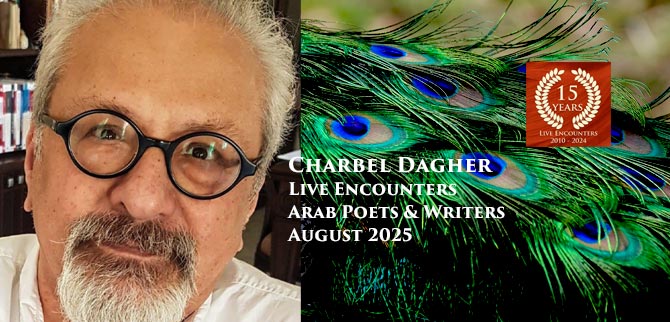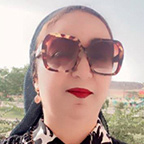
Live Encounters Poetry & Writing August 2025
The river flows in its course, poems by Charbel Dagher.
Translated from Arabic by Dr. Salwa Gouda.
The river flows in its course
The river bathes in his river
Without sudden unrest
It bathes without finding a towel
But willow leaves
Yet they lie upon it, and it cannot lift its hands
Lacking the lightness of its legs
That crosses the waters without odious waiting.
It bathes, wipes its mouth with its soaked cloth
And rows on without relent
As if today were yesterday’s table
With fingers
That trace what happened
With the very same passion
Of the lofty water droplets
Falling
Longing for air
Beyond their own breathless panting in the water chasing water.
The river flows in its course
Like a rush of shoes over the city pavements
It flows as if recalling dust parables, or the sorrows of the wave
It flows, as though the river were a single notebook, with two conjoined pages:
One to receive what newly arrives
And another to bid farewell without pain.
The river does not complain
It only bathes
As for those panting after their own shadows
They run
They complain
About last night’s taxes, due the moment sunlight glints off
Their sunglasses.
This flowing is unlike what their complaints aspire to.
This bathing is unlike what precedes, or follows, water’s sprawl in a feast.
What flows in the river, flows in a poem
Unlike the dust that washes the poet’s eyes in his city.
My River
O my river,
Oh myself
A river flows away in its course
This poem
Carries me
From myself
I drift, while I imagine myself an oar
And battle its torrent while I breathe without a metric foot.
O my river,
O myself!
I live the river
In a river
While I imagine myself pausing, or treading back to what was, to what I was
My river
My poem
Flowing
Without a stream, without depth:
I look at it
While the poem backbites me.
O river, slow down!
O my river, dwindling as you descend
Slow down!
Settle into a chair soft with grass and color
And ponder the air’s fluctuations
Before breath fails,
You may not bring with you:
An identity card
Or mobile phone.
The river knows you, even if you soften your footsteps
Those sunken, wading steps in its mystery:
Let the water’s page caress you with its softness
So, you may see the creases of your face
The tightening of your features
Without an interpreter.
Leave behind what you’ve written
Now is the time to speak—without delay, or revision
What you’ll say will be fleeting and painful
For you won’t have the strength
To reclaim it,
or erase it.
It is you, as you never were: in its easy crossing
Where speech carries its own rupture, splintering, and cessation without epilogue.
Your unfinished sentence—now is its time for completion… or to evade its closure.
Do not race toward what distracts you in the radio waves’ games!
Do not lose yourself in avoidance, escape, or preoccupations
That drown the pictorial music of water!
Now is the time to speak, if you dare utter what sinks into your subterranean currents
You are not ready for this final exercise
It may not be the final, so long as you can sit
And gaze into the river’s mirror as on a feast day.
The river moves on, yet drinks from your spring
Bathes in it in the morning’s awakening.
The river does not return
Yet leaves enduring traces in time’s formations.
The river is your bed, your chair
And the unfinished sentence in a poem.
© Charbel Dagher
Charbel Dagher (b. 1950), a Lebanese professor at the University of Balamand, is a prominent Arab cultural figure renowned as a bilingual (Arabic/French) poet, writer, novelist, translator, journalist, and scholar specializing in Arabic language, Arabic poetry, and Arab/Islamic aesthetics. Holding dual PhDs, he has collaborated internationally with universities in France, Italy, Malta, and Tunisia. Dagher has published extensively, including numerous poetry collections, novels, and influential scholarly works on Arabic calligraphy, Islamic art history, and modernity in Arabic poetry and language.
He has organized major cultural conferences, held key positions like Secretary General of the Arab African Cultural Forum, chaired international art juries (e.g., Sharjah Biennial), and served as coordinator for Léopold Sédar Senghor’s international acknowledgment. His poetry has been translated into several languages and inspired visual art and theatre, while he has also translated significant works of French and African poetry into Arabic. Recently, his poetry book “The River Bathes in Its Own Prose” won the Abu al-Qasim al-Shabi Prize for Poetry.
 Translated by Dr. Salwa Gouda, who is an accomplished Egyptian literary translator, critic, and academic affiliated with the English Language and Literature Department at Ain Shams University. Holding a PhD in English literature and criticism, Dr. Gouda pursued her education at both Ain Shams University and California State University, San Bernardino.
Translated by Dr. Salwa Gouda, who is an accomplished Egyptian literary translator, critic, and academic affiliated with the English Language and Literature Department at Ain Shams University. Holding a PhD in English literature and criticism, Dr. Gouda pursued her education at both Ain Shams University and California State University, San Bernardino.
She has authored several academic works, including Lectures in English Poetry and Introduction to Modern Literary Criticism, among others. Dr. Gouda also played a significant role in translating The Arab Encyclopedia for Pioneers, a comprehensive project featuring poets, philosophers, historians, and literary figures, conducted under the auspices of UNESCO. Recently, her poetry translations have been featured in a poetry anthology published by Alien Buddha Press in Arizona, USA. Her work has also appeared in numerous international literary magazines, further solidifying her contributions to the field of literary translation and criticism.

